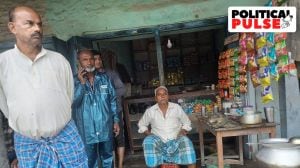Iraqis say who cares
Baghdad residents poured cold water on Iraq’s new governing council on Sunday, saying they would not support a US-backed institution or...

Baghdad residents poured cold water on Iraq’s new governing council on Sunday, saying they would not support a US-backed institution or politicians who lived abroad while they suffered under Saddam Hussein.
While US and UN officials in Iraq hailed the meeting as historic, Iraqis did not make a big deal of it — and some had not heard about it at all. ‘‘We cannot back the council. It is backed by America and it won’t change anything. America has just made empty promises,’’ said Sabah Kathim, who makes about $3 a day selling ice. ‘‘I used to stop reading newspapers so I would not have to read about Saddam. Now I don’t want to read about the Americans.’’
Few Iraqis had expected to see the day when Saddam would fall and they could openly discuss politics in a country ruled with his iron fist for nearly a quarter of a century. And even though they are tasting political freedom for the first time, they want to see democratic elections soon that are not tainted by American influence or the participation of Iraqi outsiders. Many of the Iraqis in the council were exiles.
‘‘Elections have to happen quickly or else the theft and insecurity will continue in the streets,’’ said Ghada Abboud, a seamstress in a middle class neighbourhood in Baghdad. ‘‘We don’t want Iraqi leaders who have been living abroad for years who did not see our problems inside Iraq. They have to know how we lived to rule us.’’
The council’s 25 members include Shiites, Sunnis and Kurds, reflecting Iraq’s ethnic and sectarian mix. It is designed to fill the political vacuum after the fall of Saddam on April 9 and give Iraqis more say in their lives for the first time. But such a symbolic day did not give Iraqis much hope.
In the Sadr city slum of Baghdad, home to Shiites, the majority sect persecuted under Saddam, men in tattered clothes doubted the governing council would ease the hardship. Kathim Hashim shook his head when asked about the council, which critics say was handpicked by the US-led administration controlling Iraq. ‘‘The American soldiers just drive around and make promises through loudspeakers. They do nothing. Just over there a thief shot and killed someone this morning,’’ he said.
Hashim and his friends said Iraqis had little respect for council members like Ahmed Chalabi, the Iraqi National Congress leader convicted for embezzlement in Jordan. ‘‘Where was Chalabi and the others?’’
While the meeting was beamed live around the world, some Iraqis had never heard of the council. In the upper class neighbourhood of Karada, businessman Muhammed Kamil seemed disinterested in politics as he entered his villa. ‘‘I hope it is a good thing but I have never heard of it,’’ he said. (Reuters)



- 01
- 02
- 03
- 04
- 05




























